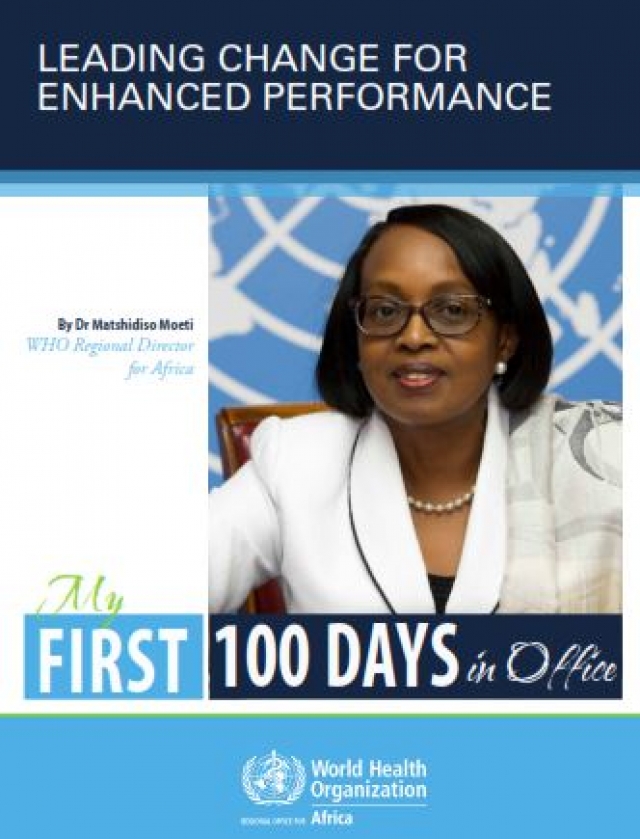Progress on the strategic actions to make better health and well-being a reality for Africans
 A new report highlighting progress made on the strategic actions initiated by Dr Moeti Matshidiso, the WHO Regional Director for Africa to make better health and well-being a reality for Africans has been released.
A new report highlighting progress made on the strategic actions initiated by Dr Moeti Matshidiso, the WHO Regional Director for Africa to make better health and well-being a reality for Africans has been released.
The report titled: ‘Leading change for an enhanced performance - My first 100 days in Office’ shows the key actions undertaken and the progress made in the five priority areas identified by the Regional Director during her mandate: These are:
(i) improving health security;
(ii) strengthening national health systems;
(iii) sustaining focus on the health-related MDGs/SDGs;
(iv) addressing the social determinants of health; and
(v) transforming WHO in the African Region into a responsive and results-driven organization.
“With the contribution of development partners and the commitment of staff we are making gradual progress. It is imperative for us to unite our efforts, drawing on our respective strengths and resources, to continue working towards addressing the health needs of the Region,” said, Dr Moeti.
The report draws attention to the deployment of over 500 WHO experts from the Region to the Ebola affected countries who are playing critical roles in field coordination, epidemiological investigation, contact tracing and community engagement. Liberia was first declared Ebola free on 9 May 2015 but a setback was encountered when new cases were reported on 29 June. Liberia has since 3 September 2015 again been declared Ebola free and WHO is working tirelessly to get to zero in the other two countries (Guinea and Sierra Leone). Structural and staffing changes to the WHO offices in the 3 Ebola affected countries have been carried out to adequately support implementation of investment plans.
In northern Tanzania, WHO alongside the Ministry of Health and Social Welfare (MOHSW), other UN Agencies and health partners responded swiftly to the cholera outbreak in refugee camps to bring the epidemic to a halt. Over 60000 lives were saved through medical assistance from cholera treatment centres. Likewise technical support from WHO experts deployed to Niger contributed to the reducing meningitis deaths from 11 to 7%. In collaboration with partners, WHO mobilized 880,000 doses of meningitis tetravalent vaccine, and contributed to immunization campaigns targeting children between the ages of 2 and 15.
Other key findings in the report are:
- The establishment of a Public Health Security and Emergencies Task Force at the WHO Regional Office to help end the Ebola outbreak and build resilient health systems in the Region.
- A region-wide assessment of Universal Health Coverage and Primary Health Care has began to establish baseline data for effective monitoring along with the development of a new strategy to guide AFRO’s health systems work and a regional strategy on UHC.
- Drastic improvement in submission of donor reports with outstanding reports dropping substantially from 380 in December 2014 to 166 in May 2015.
- Mandatory training has been put in place for employees in procurement to sharpen skills in obtaining value for money.
- Key performance indicators have been agreed for administration, procurement and finance staff as well as a reorganization of the compliance functions to take preventive actions
According to the Report collaboration has also been strengthened with a range of international development partners including the UN Economic Commission for Africa, the African Union (AU), UN Office for Project Services (UNOPS), and United Nations Population Fund (UNFPA). The collaboration focuses on strengthening the capacity of countries in health security, data and knowledge management, procurement and supply chain management; local production of HIV drugs; support to the Africa Centre for Disease Control and Prevention (Africa CDC) among others.
In concluding the report, Dr Moeti said: “I am confident that the changes we have initiated and the commitment to working in a more responsive, result-focused and accountable manner with Member States will go a long way in improving our effectiveness”.
Leading the Change for Enhanced Performance in the African Region: My First 100 Days in Office


